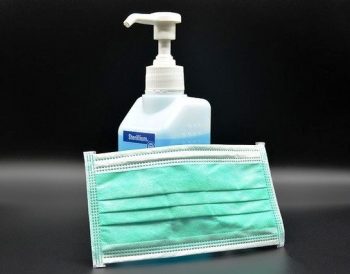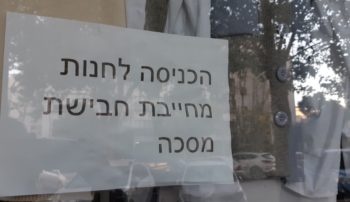Coronavirus in Israel: How to Use the Hebrew Word for Mask Posted by Ayana on Apr 15, 2020 in Uncategorized
On April 1, Prime Minister Benjamin Netanyahu delivered another update to the people of Israel. He usually addresses the nation from the briefing room in the Prime Minister’s Office, but after one of his advisers had contracted the coronavirus, Netanyahu was self-quarantined, and spoke from his official residence in Jerusalem. I did my own makeup and hair, he admitted.
Netanyahu announced new intensified restrictions on activity and personal movement as part of the country’s efforts to combat the spread of the pandemic. Organized gathering of more than 2 people is forbidden. Essential business that are still allowed to operate will need to reduce their workforce from the current 30% to 15%. Netanyahu called on Israelis not to visit family during Passover holiday observed mid-April. He also ordered all Israelis to wear face masks in public.
Watch the prime minister’s declaration in the next video:
The Hebrew word for mask is מַסֵּכָה; a three syllables word, pronounced as ma-se-ha. מַסֵּכָה is an object worn on the face, for disguise, or entertainment; such as the Jewish carnival-like holiday Purim, for example, known as חַג הַמַּסֵּכוֺת. Purim is a happy colorful holiday, when Jews are enjoined by the Book of Esther (9:19-22) to observe a day of joy and feasting. A popular custom is wearing masks and costumes. הַיֵּשׁ צוֺהֶלֶת וּשְׂמֵחָה כָּמוֺנׅי מַסֵּכָה (is there a mask joyous and happy as me), is a famous line from a festive Purim song. But masks are also used for protection, like the surgical masks worn by health professionals during surgery, or like the gas mask Israel citizens used during the Gulf War in 1990. Mask is also a short for cosmetics facial mask (מַסֵּכַת פָּנִים), a cream applied to the face for treating the skin and improving its appearance.
מַסֵּכָה is a feminine noun, and its plural form ends with the feminine suffix ot: מַסֵּכוֺת, pronounced as ma-se-hot. Adjectives describing masks should appear in their feminine form, conjugating to single or plural in accordance. For example:
חֶבְרָה מְקוֺמׅית פּׅתְחָה מַסֵּכָה חֲדָשָׁה נֶגֶד הַנְּגׅיף.
A local company has developed a new mask against the virus.
כֵּיצַד לְהָכׅין מַסֵּכָה טׅבְעׅית לְעוֺר יָבֵשׁ.
How to make a natural mask for dry skin.
מַסֵּכוֺת מְמַלְאוֺת תַּפְקִיד חָשׁוּב בְּקַרְנָבָלׅים רַבּׅים וּבְתַרְבּוּיוֺת שׁוֺנוֺת.
Masks play an important role in many carnivals and cultures.
הַאִם מַסֵּכוֺת בֶּאֱמֶת מְגֵנוֹת עֲלֵינוּ מְהַנְּגׅיף?
Do masks really protect us from the virus?
Netanyahu ordered:
אֲנַחְנוּ מְבַקְשׁׅים מׅכֵּם, אֶזְרְחֵי יִשְׂרָאֵל, לַחְבּוֺשׁ מַסֵּכוֺת בַּמֶּרְחָב הַצִּבּוּרִי. אׅם אֵין בּׅרְשׁוּתְכֵם מַסֵּכָה הׅשְׁתַמְשׁוּ בְּצָעׅיף אוֺ בְּכָל כּׅיסּוּי פָּנִים אַחֵר שֶׁיְצַמְצֵם אֶת הֲפָצַת הַנְּגׅיף לַאֲחֵרׅים.
We ask the citizens of Israel to wear masks in the public domain. If you don’t have a mask, use a scarf or any other covering that will reduce the possibility of infecting others.
In his announcement Netanyahu used two verbs: לַחְבּוֺשׁ (to put on a head covering), and לְהׅשְׁתַמֵּשׁ (to use). לַחְבּוֺשׁ (to put on a head covering) is a specific verb for hats and bandages. In the past, head coverings were made of a bandage-like cloth and were wrapped around the head like a bandage. The verb לַחְבּוֺשׁ therefore served as both hats and any kind of bandages. The Academy of the Hebrew Language approved the use of the verb לַחְבּוֺשׂ with masks, as well, since they are wrapped around the mouth.
Two other verbs can be used for masks: לַעֲטוֹת (to wrap), and לָשִׂים (to put on). According to the Academy of the Hebrew Language, לַעֲטוֹת is the most appropriate verb. Although the verb can be used with other clothing items, bearing the meaning of putting on, its main usage in the biblical texts bears the meaning of wrapping and covering. In one case in the bible, the verb לַעֲטוֹת is even used with a mask for protection from leprosy. Another verb used for mask – לׅלְבּוֺשׁ (to wear) – is common in spoken language.
For example:
שׁׅימוּשׁ לֺא נָכוֺן בַּמַּסֵּכָה עָלוּל לׅגְרוֺם נֶזֶק.
Improper use of the mask may cause damage.
חוֹבָה לַעֲטוֹת מַסֵּכוֺת כְּשֶׁיוֺצְאׅים מֵהַבַּיִת.
Compulsory to wear masks when going out.
מַהִי הַדֶּרֶךְ הַנְּכוֺנָה לַחְבּוֺשׁ וּלְהַסּׅיר מַסֵּכָה?
What is the right way to wear and remove a mask?
The director-general of the Health Ministry, addressed the people right after Netanyahu, explaining that wearing masks is an easy way to protect us and others. But there’s no need to buy any that are professionally manufactured. Save the masks for medical teams, he asked, and improvise one at home.
Watch the director-general of the Health Ministry’s declaration in the next video:
A new Health Ministry directive approved by the government a week later, on April 7, makes masks in public compulsory. Acknowledging a shortage of masks, the authorities said they can be homemade or makeshift, but should cover the mouth and nose.

Build vocabulary, practice pronunciation, and more with Transparent Language Online. Available anytime, anywhere, on any device.





